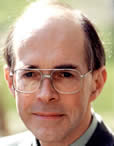A Sermon for Laetare Sunday (O’Donovan, 2006)
We are his workmanship, created in Christ Jesus unto good works, that we may walk in them. (Eph. 2:10) Dietrich Bonhoeffer, in the last theological work he laboured at before his imprisonment and death, the Ethics, wrote, pregnantly and provokingly, “It would seem that the knowledge of good and evil is the goal of all our ethical thinking. The first job of Christian Ethics is to get rid of that knowledge.” I don’t presume to …


